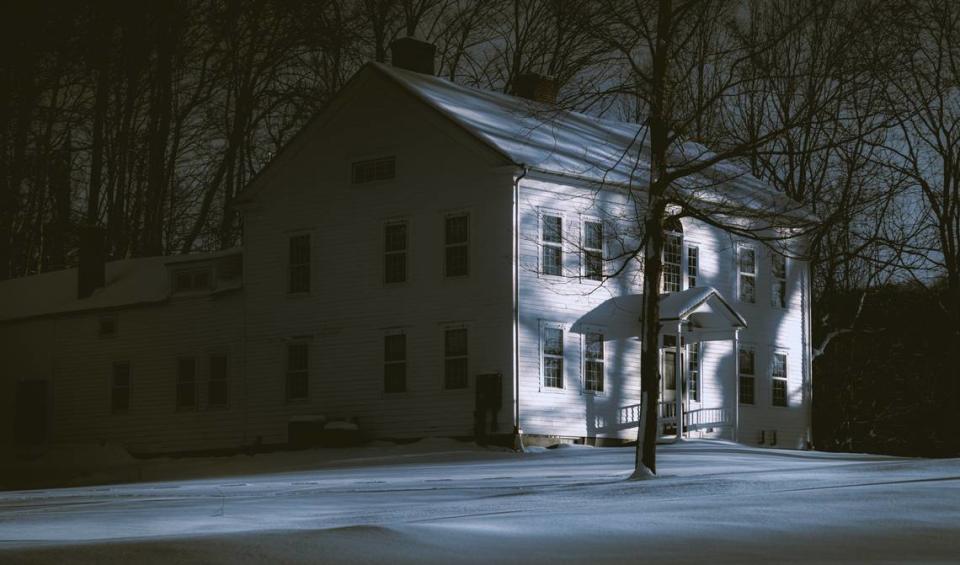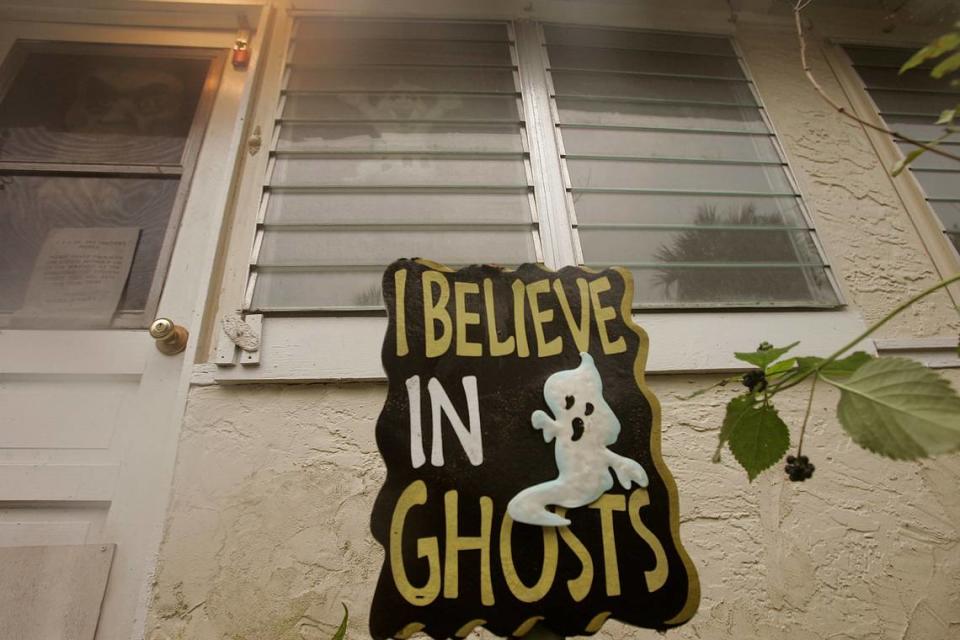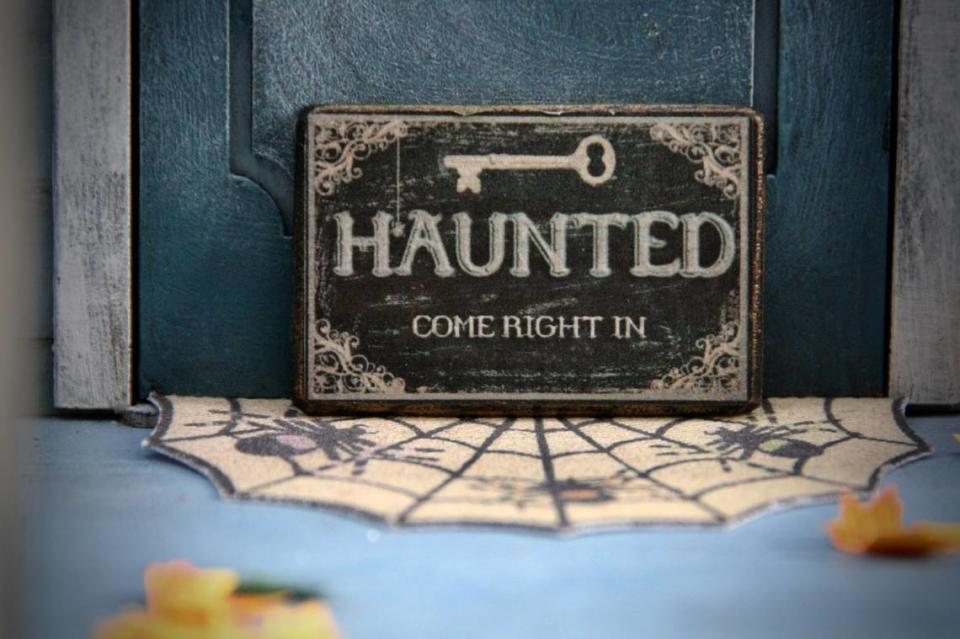Should ‘haunted’ homes come with a warning? What realtors and paranormal experts say
It was nearly 20 years ago, but Cindi Hagley, a realtor in California’s Bay Area, still remembers being alone inside a home in Antioch when she swore she spotted something out of the corner of her eye.
Hagley, who left a career as an ABC TV executive in 2006, hosted an open house for the property the following afternoon. A neighbor arrived, eager to see the inside — and that’s when she learned the “scary” home had a decades-long reputation of being haunted.
Hagley later informed the seller of this “interesting feedback.” They told her “oh yeah, we’ve got a ghost.”
She wondered what would happen if she started marketing the home as “haunted.” When she did, the interest spiked.
Her marketing strategy worked out in her favor, although she ultimately sold the home to buyers who didn’t believe in ghosts, she explained.
She first made her mark selling homes rumored to be haunted, including that first one she ever sold in Antioch, but she’s not a “’haunted house realtor’ as some folks claim to be,” she told McClatchy News.
Nowadays, Hagley, who grew up in West Virginia and Ohio and lived in homes she believes were haunted, takes a different approach and no longer markets homes as potentially haunted, she said.
“Nor do I disclose it until we’re already in contract.”
In California, disclosing a potential haunting isn’t required, or mentioned, by state law. This is similar for the majority of states in the U.S., according to a recent Zillow analysis.
However, a few states — Minnesota, Massachusetts, New Jersey and New York — do have laws mentioning paranormal activity when it comes to real estate.
Two states with laws mentioning the ‘paranormal’

In Minnesota, there is no duty for sellers to disclose if a home is “the site of a suicide, accidental death, natural death, or perceived paranormal activity,” according to state law.
Cari Ann Carter, a realtor with Edina Realty, a top producing broker in the Twin Cities in Minnesota and the owner of the Cari Ann Carter Group, has represented over a thousand homes for sale over the past 25 years, she told McClatchy News.
Of those homes, she’s come across around five she believes were potentially haunted, which she said is rare.
In regards to disclosures, despite there being no requirement in the state to do so, Carter views it as unnecessary to mention if a home comes with potential ghosts and describes doing so as “opening a can of worms” because it is subjective.
“Some people don’t even believe in this at all … at the end of the day, what you’re selling is real estate and, you know, architecture and a lifestyle,” Carter said.
Certain details that do need to be disclosed to buyers in Minnesota relate to the physical condition of the property, Carter explained, such as mold, prior zoning violations or criminal activities — specifically whether methamphetamine was manufactured inside a home.
As for potential hauntings, Carter, who describes herself as very in tune with energy, believes they can happen, but that they’re not “as frequent as people think they are.”
On one occasion, she had a “bizarre” experience when showing a family a home along Summit Avenue in St. Paul, where there’s a large amount of historical homes.
While walking up the home’s staircase, she said she suddenly felt as if she “walked through a cold ice wall,” turned around and tripped down the stairs. She said it felt as if she was pushed.
“I looked at the family and said this isn’t the right property. We need to go now,” she said. “Now is that a regular occurrence? No …you either resonate with that and believe in it or you don’t.”
Later, she said she was told a murder took place at the property.
Similar to Minnesota, Massachusetts state law specifically mentions perceived “paranormal phenomena” as something that doesn’t need to be disclosed ahead of the sale of a home.
“There’s no way to prove paranormal activity,” Carter said.
“There’s a lot bigger subjects that have to be discussed, like affordability … meeting the needs of the client.”
New York, where one home is legally “haunted”

In New York in 1991, the state Supreme Court ruled one home in Nyack — a village nestled along the Hudson River about an hour’s drive north of New York City — was “haunted as a matter of law.”
The ruling stemmed from how a buyer sued the woman who sold him the home after she didn’t tell him it was purportedly haunted — a reputation she helped perpetuate. As a result, the man filed suit to rescind the contract of the sale, according to Cornell Law School’s Legal Information Institute.
“Plaintiff, to his horror, discovered that the house he had recently contracted to purchase was widely reputed to be possessed by poltergeists,” Justice Israel Rubin wrote in the famous case of Stambovsky v. Ackley.
While the home’s owner, Helen V. Ackley, reported the existence of “spectral apparitions” in her home to the media, which once described her home as a “riverfront Victorian (with ghost)” she made no mention of paranormal activity to Jeffrey M. Stambovsky, who was from New York City.
The State Supreme Court’s appellate division ruled in favor of Stambovsky, arguing Ackley should’ve disclosed the purported hauntings to him as she did to the public. The ruling rescinded the contract of the sale and allowed Stambovsky the “recovery of his down payment.”
Jill McDowell, a real estate agent in Long Island, New York, who has worked in the business for nine years after a 20-year career as a TV news reporter, told McClatchy News that while she believes homes can be haunted, she’s never sold or attempted to sell such a property.
“If a seller believes their home is haunted and it’s known throughout the community, I think, without a doubt that a seller should not only tell the agent but also allow the agent to disclose that information to potential buyers,” she said.
She said her friend purchased a home that she later discovered was haunted. While her friend considers the rumored spirit that dwells in it to be “friendly,” McDowell said she wishes the seller disclosed the haunting.
Paranormal investigators weigh in

Kathy Eastman, a medium and team member of the Paranormal Investigators of New England — an organization founded in 2004 that conducts paranormal investigations free of charge — lived in a home she and her family believed was haunted in New Jersey as a child, she told McClatchy News.
“When my parents sold their haunted house they did disclose it,” Eastman said before her family moved to Vermont in 1975.
In New Jersey law, certain “psychological impairments” related to a home, including “a property purportedly being haunted,” don’t need to be disclosed — unless the potential buyer asks about it.
Eastman said she and her parents felt a potential buyer should know if the house was haunted before the sale, she said.
“If I’m buying the Amityville Horror House and I don’t actually know the background of it, I think that should be disclosed … or the Conjuring house,” she said.
As a member of the Paranormal Investigators of New England, which is part of The Atlantic Paranormal Society (TAPS) founded in 1990 by Jason Hawes of the TV series “Ghost Hunters,” Eastman and her colleagues conduct an in-depth investigation to determine if a home is “haunted.”
Team members rely both on equipment — including digital recorders to capture “electronic voice phenomena” body cameras, a temperature gun, a thermal imager and a night heat seeking camera — and the abilities of certain members, including herself, she describes as “sensitives.”
They will first do a walkthrough of a home, making observations of what they see, feel and hear, before consulting with the client about their personal experiences. Then, they will go back in and conduct an investigation using their equipment before making conclusions in a written report, Eastman said.
Sometimes, there may not be a paranormal issue occurring, according to Eastman, who said the team tries to “debunk everything that we can.”
“We’re there to distinguish what is (paranormal) and what isn’t,” Eastman said.
“It may be a tree was banging against the wall on the outside of the house … or, you know, maybe there were pests up in the attic and running around … rather than rustling from a spirit,” Eastman said.
“We take all the evidence and put it together before we make a determination,” she added.
Dan Pacella, the lead paranormal investigator and co-founder of Orange County NY Paranormal, which conducts paranormal investigations throughout New York, estimates for the majority of residential properties they investigate, they “don’t usually find much.”
However, there’s been a few instances where there’s been “a lot of activity,” Pacella said.
He said the investigations his team conducts are purely equipment-based, as no one currently on the team is a psychic or medium.
When asked if he believes whether potential hauntings should be disclosed, Pacella said he understands why people choose not to disclose it.
“It’ll either help you sell it or help you not sell it. I know people that if they know a house is haunted, they would probably buy it in five seconds,” he said. “But some people want nothing to do with it.”
“I can play voices for you that I’ve captured in a house,” he added, “but if you don’t believe they’re there … there’s nothing I can do.”
But Pacella stressed that even if you believe a home comes with uninvited paranormal guests, you shouldn’t fear the worst.
“Satan is not in everybody’s basement,” he said. “We don’t run into a lot of negative entities because we don’t seek them out and nor do we antagonize.”
Disney ‘lists’ its iconic Haunted Mansion for sale. The asking price? Your soul
Abandoned school is for sale in Oklahoma. Do you think it belongs on ‘Ghost Adventures?’
Are ghosts lurking in Minnesota home for sale? Zillow Gone Wild thinks so. Take a look

